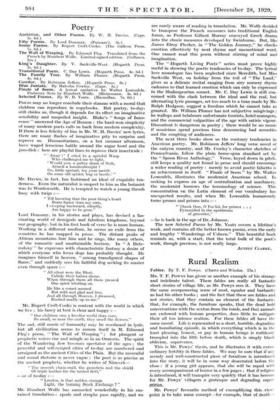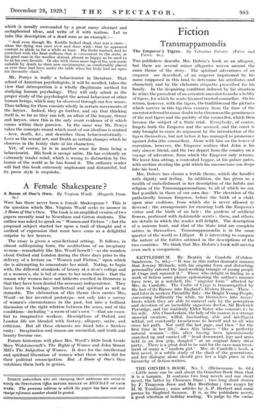Rural Realism
MR. T. F. POWYS has given us another example of his strange and indelicate talent. These fables are really all fantastic short stories of village life, as Mr. Powys sees it. They have the same overpowering sense of mud, squalor and barbarity as had his other books ; and the fact that these are fables and not stories, that they contain an element of the fantastic, that, for example, the furniture speaks, that the dead hold conversations with the sexton from the tomb, and that animals are endowed with human properties, does little to mitigate their all too intense realism. For these fables all have the same moral. Life is represented as a short, horrible, degrading and humiliating episode, in which everything which is in the least pleasing, honest, or gay in human beings is ruthlessly trampled into the filth before death, which is simply blank oblivion, supervenes.
This is Mr. Powys' thesis, and he illustrates it with extra- ordinary fertility in these fables. We may be sure that if any seemly and well-constructed piece of furniture is introduced into the story, it will be in some way desecrated before the close : if a young girl appears, that she will be raped with every accompaniment of horror in a few pages ; that if religion is introduced, it will transpire very quickly that it has become for Mr. Powys' villagers a grotesque and degrading super- stition. • • Mr. Powys' favourite method of exemplifying this .view- point is to take some concept-=for example, that of _death-
which is usually surrounded by a great many abstract and metaphorical ideas, and write of it with realism. Let us take this description of a dead man as an example :-
" And even though Mr. Keddle looked dead, that was a state— when the dying was once over and done with—that he appeared content to abide in for a while at least. His limbs washed, and he stretched with the final stiffness that is convenient to the state, at his good ease in the woollen shroud, almost as happy as he used to be at his own fireside. Or else with those same legs of his, now made suitable by death to their new environment, as comfortably placed
as ever they had been under the table when his body had sat upon his favourite chair."
Mr. Powys is really a behaviourist in literature. That school of American psychologists, it will be recalled, takes the view that introspection is a wholly illegitimate method for studying human psychology. They will only admit as the proper study of the psychologist the actual behaviour of other human beings, which may be observed through our five senses. Thus talking for them consists wholly in certain movements of the larynx. Indeed, they go further, and say that thinking itself is, so far as they can tell, an affair of the tongue, throat and larynx, since this is the only overt evidence of it which comes within their purview. In the same way Mr. Powys takes the concepts round which most of our idealism is centred —love, death, &c., and describes them behaviouristically— Love as the sexual act, and Death as certain changes which he observes in the bodily state of his characters.
Yet, of course, he is in another sense far from being a behaviourist. His book is savage satire. He has evidently an extremely tender mind, which is wrung to distraction by the horror of the world as he has found it. The ordinary reader will find this book extremely unpleasant and distasteful, but its prose style is exquisite.

































 Previous page
Previous page